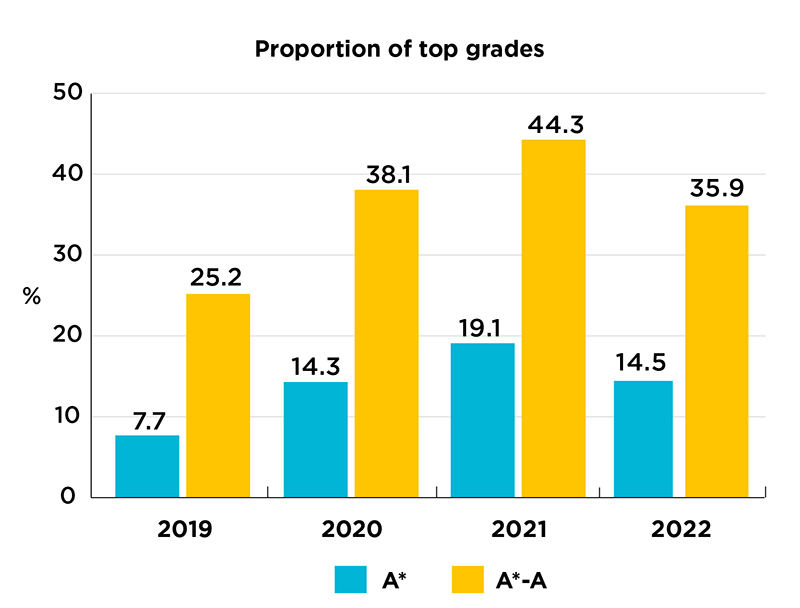The proportion of top A-level grades achieved by pupils in England has dropped 19 per cent after the first summer exams in three years, but remains much higher than in 2019.
Today’s data shows 35.9 per cent of grades handed out this year were A* or A grades, down from 44.3 per cent in 2021 and 38.1 per cent in 2020 – when teachers decided grades.
But top grades are still up on 2019 results (25.2 per cent) – the last year summer exams were held.
The Joint Council for Qualifications has published the results from the first summer A-level exams since the pandemic began. Pupils were awarded centre-assessed grades in 2020 and teacher-assessed grades in 2021 because of Covid disruption.
The proportion of grades at C and above fell to 82.1 per cent from 88.2 per cent in 2021 and 87.5 per cent in 2020, but again, this was higher than in 2019, when 75.5 per cent of grades were at that level.
Students receiving three A* grades fell to 8,570 pupils, down from 12,865 in 2021.
However, this still remained higher than the 7,775 seen in 2020, and more than triple the 2,785 pupils who reached that benchmark in 2019.

Pupils ‘broadly midway’ between 2021 and 2019
The drop in top grades was expected. Exams watchdog Ofqual instructed exam boards to peg the results in between those received in 2019 when formal exams last happened and 2021, which saw by far the highest top grades on record.
Exam boards are publishing grade boundaries today, which are generally lower this summer in 2019. However, Ofqual says not all grades boundaries are lower since “position of the boundaries also reflects the difficulty of the assessment”.
Dr Jo Saxton, chief regulator, said the class of 2022 “can be so proud of what they have achieved”.
“I felt strongly that it would not have been right to go straight back to pre-pandemic grading in one go but accept that we do need to continue to take steps back to normality.
“These results overall, coming as they do broadly midway between 2021 and 2019, represent a staging post on that journey.”
Ofqual is aiming to confirm grading plans for 2023 summer exams in September.
Private school and London pupils fare best once again
The proportion of top grades awarded was once again highest in private schools. This year, 58 per cent of grades issued to private school pupils were As or above, compared to 35 per cent in academies, and 30.7 per cent in comprehensive schools.
As was the case last year, pupils in London fared the best in the exams, with 39 per cent of grades at A* to A, compared to 30.8 per cent in the north east.
London also enjoyed the greatest rise in top grades between 2019 and 2022. Over the three years, the proportion of A* and A grades rose by 12.1 percentage points in the capital, compared to 7.8 percentage points in the north east.
This will likely prompt questions about the uneven regional impact of the pandemic on students during the last two years.
However, although data by school type, gender and region have been published, we will have to wait until the autumn to see how other different groups of pupils, such as those on free school meals, fared.
This is because Ofqual has had less time to analyse the results than in the last two years, when grades were submitted earlier.
Today’s data also shows the gender gap in top grades has widened since 2019 across the United Kingdom.
This year, 14.8 per cent of grades issued to girls were A*s, compared to 14.4 per cent of grades issued to boys. This contrasts to 2019 when boys’ outcomes were higher.
The proportion of A* to A grades issued to girls was 37.4 per cent, compared to 35.2 per cent for boys, whereas outcomes were the same in 2019.
Don’t ‘fixate’ on grades, says leader
Geoff Barton, general secretary of the ASCL school leaders’ union, congratulated pupils receiving results.
“To say they deserve great credit is an understatement given the context of a global pandemic which has caused huge disruption to their studies over the past two-and-a-half years.”
However, he warned it was “likely that results at the level of schools, colleges, and students will be uneven because of the highly variable impact of the pandemic with those affected more by infections potentially faring less well than others”.
“Adaptations were made to exams to try to mitigate this impact in as far as that is possible but this is not a normal year by any measure and it is important that we focus on supporting the progression of students rather than fixating too much on grades.”







Your thoughts